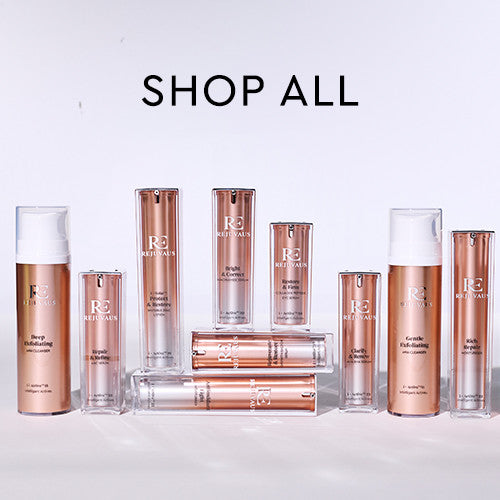You have no items in your shopping cart.
25-4-2023
Everything You Should Know About Vitamin C In Skincare
DR GARRY CUSSELL

Vitamin C, once hidden away in “brightening serums” and “day creams,” has taken centre stage the skincare world, and with good reason.
According to Cosmetic Physician and Rejuvaus founder Dr Garry Cussell, Vitamin C is one of the three most important antioxidants (the others being Vitamin A and Vitamin B3) that have proven direct and indirect effects on improving the skin’s complexion.
The catch is that you only get the benefits of Vitamin C when it’s in a stable formulation and absorbed properly into the skin.
Read on to understand how Vitamin C works, and how you can include it in your skincare routine to reap the most benefits.
What does vitamin C do in skincare?
This incredible little vitamin is a multi-purpose molecule with a few benefits. It essentially enhances your skin cells as an antioxidant, a collagen synthesiser and a natural skin brightener.
The Vitamin C that you consume in your food acts as an antioxidant because it reduces free radical damage in the tissue cells in your body. When applied topically, it can do the same for your skin, thus reducing some signs of ageing.
It also helps to reduce signs of ageing by helping your cells synthesise collagen. Skin is made up of a collagen matrix, and each collagen fibre is made up of cells with amino acids. Vitamin C interacts with the amino acids inside the collagen cells so they can excel at rebuilding collagen fibres. Stronger collagen fibres means less creasing and sagging in your youthful, beautiful skin.
![[S2] Bright & Even Pigment Serum Vitamin C in skincare](https://cdn.shopify.com/s/files/1/0507/0477/7393/files/Vit-C-Featured-Cover_360x.jpg?v=1695956901)

Pigmentation & Sun Damage
As a natural skin brightener, Vitamin C helps to inhibit pigment-producing enzymes, so you get a more even skin tone. This is a bonus for those of you who are prone to pigmentation caused by sun damage. People who use Vitamin C regularly also tend to get a brighter, more glowing complexion as their natural pigments are more well-regulated.
It also helps with hydration as it aids production of Hyaluronic Acid in the skin.
The most remarkable trait of Vitamin C is that it is one of the few active ingredients that can penetrate deeply, but this also depends on the type of Vitamin C and how it is formulated.
Types of Vitamin C: Pure vs Derivatives
In your skincare products, you might find pure forms of vitamin C, known as L-Ascorbic Acid, but more often than not, you’ll come across derivatives that convert into vitamin C once they’re absorbed into your skin.
This is because, while the purest form is effective, it’s also the most unstable and the most prone to oxidisation.Exposure to light and air can break vitamin C down and cause it to oxidise. When oxidised, the molecular structure of the vitamin changes, and it can start to cause oxidative stress on your skin. In other words, oxidisation turns your Vitamin C from a damage-fighting antioxidant into a damage-causing free radical.
If your vitamin C serum becomes cloudy, dark, or if it develops an unpleasant odour, it’s probably become oxidised; stop using it right away.Another issue with L-Ascorbic Acid is with stabilisation.
To keep it stable, it needs to be formulated in a low pH level, which can cause irritation in your skin.
Derivatives of Vitamin C tend to be more stable and less irritating, and they can be equally effective. Here is a breakdown of some different forms of Vitamin C:
L-Ascorbic Acid
This pure Vitamin C is the same as dietary Vitamin C (the “L” merely refers to the shape of the molecule).
As mentioned above, it needs to be combined with stabiliser ingredients, and even then, it’s highly prone to oxidisation. It only absorbs into your skin at a pH level of 2.5 – 3. Your skin’s natural pH sits at 5.5, so this difference poses a risk for irritation.
Sodium Ascorbyl Phosphate
This derivative of Vitamin C is technically a form of salt. It’s stable at pH level 7 and converts into pure Vitamin C once absorbed in the skin.
Though it’s less irritating, it’s also known for being less effective than other forms.
Magnesium Ascorbyl Phosphate
This is another non-irritating derivative of Vitamin C, stable at pH level 7 and water soluble, but it is much more effective than Sodium Ascorbyl Phosphate, and it has much more evidence behind it as an antioxidant, a collagen-booster and a pigment regulator.
Ascorbyl Glucoside
This is another non-irritating derivative of Vitamin C, stable at pH level 7 and water soluble, but it is much more effective than Sodium Ascorbyl Phosphate, and it has much more evidence behind it as an antioxidant, a collagen-booster and a pigment regulator.

Superox-C
This is technically an extract from the Kakadu plum, an Australian native known as the world's richest source of Vitamin C. It’s stable at a range of pH levels and non-irritating. Clinical testing on human subjects performed by Superox-C suppliers has shown up to a 50% increase in natural Hyaluronic Acid production and visibly reduced wrinkles in test subjects who performed regular split face applications (one side Superox-C, the other side a placebo).
How to Introduce Vitamin C into your skincare
Traditionally, Vitamin C was the staple of day creams, earning it a place in beauty enthusiasts’ morning routines, but it doesn’t always have to be reserved for morning.The reason that so many day creams had Vitamin C was because night creams traditionally had Vitamin A.
The larger skincare brands would separate the two ingredients in attempt to decrease any risk of irritation (which can happen when you first start using active skincare). Vitamin A can increase your sensitivity to UV rays from the sun, so it was often recommended for evening use. Vitamin C can help reduce sun damage, so it became the natural choice for the daytime.
The problem with this separation is that Vitamins A and C can work very well together. Vitamin A helps to promote collagen production, and Vitamin C helps the collagen cells synthesise. Together, they’re a powerful youth-enhancing duo.
When you first start to use Vitamins A and C together, introduce them slowly, starting every other day, to let your skin adapt.Though Vitamin C has popped up in creams, serums, moisturisers, and even some sunscreens, we recommend using a serum because it’ll be more concentrated with fewer other ingredients to interfere with absorption.

Dr Garry Cussell
Dr. Garry Cussell strongly believes everyone's skin can look beautiful at any age regardless of their history, and that lasting beauty comes from within. We enable anyone to achieve professional results safely and easily in the comfort of their own homes.
Dr Cussell is the founder of Rejuvaus Skincare and Rejuvenation Clinics of Australia. He is a member of the Australasian Society of Cosmetic Medicine and has been a qualified cosmetic practitioner for over 37 years.
He is a leading cosmetic medicine expert in a wide range of non-surgical skin procedures such as skin tightening and strengthening, stem cell and growth factor skin, and skin repair lasers.







